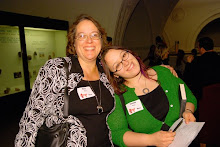A year ago today I had a fairly normal day. I had lunch with my friend Jaya. I went to a yoga class and had a writing workshop and things were basically fine. My mom had just finished chemo for her breast cancer, but the doctors had told us that once she was done with that the chances of the cancer ever coming back were 3%. Though I was concerned that the drugs seemed to have done a serious number on my mother, giving her endless headaches, and leaving her feeling weak and constantly tired, I was very glad it was over, and unconcerned about a relapse, seduced by that magical 3%.
That was the last normal day of my life. The next morning my dad called me at about 6:30 in the morning from the hospital. Over dinner the night before my mom had had a seizure, and my father had rushed her to an emergency room. Overnight she'd undergone a series of tests that revealed the cancer had spread to her brain, where it was spotting the gray matter and putting pressure on her brain causing the headaches, and ultimately the seizures.
It's a bizarre thing, realizing how quickly life can change. One minute you're eating dinner, the next minute you're dying. One minute you're lying in bed, the next your life is crashing down around you.
I spent most of that first day of not-normal life holed up in my apartment with a good friend. I remember I kept checking the news, as if expecting to see my mother's diagnosis splashed across the headlines. I spoke with various members of the family all day, all of us traumatized, confused, disoriented. That was the beginning of six months of lessons in how quickly things can change. In meeting after meeting with doctors we got new and always astounding information. The cancer spread inconceivably quickly, and as soon as we finished treatment for one issue, a new one cropped up. Finally, there was the ultimate change, from life to death.
One of the things that I often think about when I'm struggling with saying Kaddish is how is provides a sense of stability in this year. Many things are still changing in my life, but there is a constant running through my days. It's not a fun constant, and I haven't found it to be healing in the way that many people have told me they find Kaddish to be healing, but it provides a rhythm to my life now that I didn't have before.
Still, I'd take a hundred more years of changes for five more minutes with my mom.



